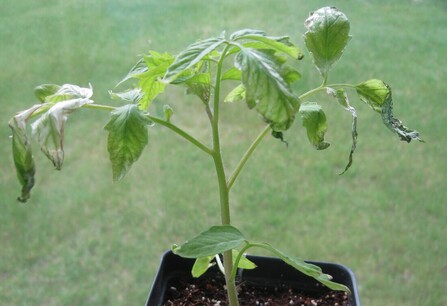|
Whether you have started seedling in your house or have gone to the garden store and purchased seedlings, you will give them the best start by hardening off the little plants for up to ten days before planting them in the garden. Hardening off is the process of acclimating your young plants to the new environment they will be living in the same way you might go to a tanning parlor a few times before heading off to a sun filled vacation--you don't want to get a sun burn your first day. Likewise you don't want to sunburn your little plants or put them in shock with temps colder than they are used to. Start a week to ten days before you plan to start planting in the garden. Some garden store plants that have spent time outdoors will not need this but any that have lived inside a green house will need at least 4 days. Start out slowly with a few hours outside in partial shade on a mild day and away from strong wind or hard rain. Over a few days you will increase that time and exposure to the sun making sure the plants don't dry out. When you know overnight temps will be mild, leave the plants out overnight protected from browsing deer or rabbits. If temps are going to be a bit cold you can bring the plants in or cover them up overnight. Hardy and half-hardy plants such as broccoli, cabbage, lettuce and some herbs, can take temps as low as 45 degrees. Tender plants that have not been well established in the garden will not be happy with temps cooler than 60. You want to be sure your plants get well established in the garden before they have to endure some of the unseasonably cool nights we get here in the north county. What can help speed this along is making sure your soil temp in the garden is at least 60 degrees before transplanting. Onions, chard, lettuces kale, peas and spinach are fine when the soil is cooler. For tomatoes and peppers, warmer is better. Even if you have to wait a bit longer than you would like for the soil temperature to get to 60 or more, it will pay off in the long run as your plants will get established that much faster. How to tell if the soil is warm enough? Dig a small trench about 6 inches deep and hold the back of your hand in it for a minute or so, if it feels cold, you will want to wait. If it feels cool, or "nice" or you detect no temperature difference, it should be warm enough to start planting. Soil thermometers are economical or you can also use an instant read cooking thermometer--use a screwdriver to make the hole before pushing in the thermometer. Water your seedlings once planted but do not drown them with too much water. Their new soil environment will probably not be as hospitable as the mix you used for starting them so be sure not to over water them. In a few days, use a diluted fertilizer to help them along while they are getting established. Avoid stressing the plants with too much fertilizer. After planting, keep tabs on night time temps and cover if need be and be sure to protect them from pests out looking for a snack. Article submitted by Pamela Davies MGV
2 Comments
Roseann Meixelsperger
5/22/2019 07:17:23 am
Valuable information. I especially liked being reminded to check the soil temperature.
Reply
abdesslam
7/8/2020 01:31:07 am
thank you for your valuable informations and advice
Reply
Leave a Reply. |
|
| North Country MGV | gARDEN bLOGS |
Location |
|

 RSS Feed
RSS Feed